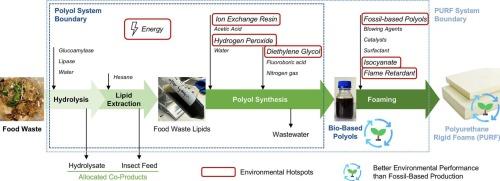Environmental benefits of valorising food waste into bio-based polyols for the production of polyurethane rigid foams
IF 9.6
1区 环境科学与生态学
Q1 ENVIRONMENTAL STUDIES
引用次数: 0
Abstract
Under the global pursuit of sustainable development, waste streams are being recognised as renewable feedstocks to produce value-added products. Given this, food waste (FW) was explored to synthesise bio-based polyols to further develop polyurethane rigid foams (PURF). However, relevant environmental aspects are yet to be examined to support this biorefinery scheme as a green and sustainable solution. In this work, we examined the environmental performance associated with the production of PURF using polyols derived from a FW biorefinery scheme by life cycle assessment (LCA). Analysis was first conducted at the polyol level. Different allocation and offset options were examined to configure the LCA model. Based on mass allocation, compared with fossil-based production, the production of FW-derived polyols achieved reductions of 24.30 % and 34.19 % in global warming potential (GWP) and cumulative energy demand (CED), respectively. At the midpoint level, FW-derived polyols had reduced impacts on human carcinogenic toxicity, freshwater eutrophication, and fossil resource scarcity but caused additional burdens on freshwater and marine ecotoxicity. Key environmental hotspots at this level included diethylene glycol, ion exchange resin (epoxidation catalyst), and hydrogen peroxide. The lipid content in FW also played a significant role. It was demonstrated that reducing the use of enzymes for FW hydrolysis to a cost-effective level remarkably mitigated the overall impacts of FW-derived polyol production. At the next level, we examined the production of FW-derived PURF using the obtained polyols. When 70 % of the polyols were replaced with bio-based products, the resultant PURF production achieved a GWP and CED of 5.67 kg CO2eq and 110.66 MJ/kg, respectively. In general, FW-derived PURF leads to environmental benefits compared to fossil-based ones. However, isocyanate used for foam formulation was the dominant contributor, causing almost two-thirds of the total impacts. The flame retardant also caused considerable impacts. Through the systematic examination of FW-derived polyols and PURF, this study demonstrated that FW-derived PURF could benefit the sustainable development of FW biorefineries and bio-based plastic industries, while the identified environmental hotspots need to be further studied and replaced with greener substitutes.

将食物垃圾转化为生物基多元醇用于生产聚氨酯硬质泡沫塑料的环境效益
在全球追求可持续发展的背景下,废物流被认为是生产增值产品的可再生原料。有鉴于此,人们探索用食物垃圾(FW)合成生物基多元醇,以进一步开发聚氨酯硬质泡沫(PURF)。然而,相关的环境问题仍有待研究,以支持这一生物精炼计划成为绿色和可持续的解决方案。在这项工作中,我们通过生命周期评估(LCA)研究了使用从 FW 生物精炼计划中提取的多元醇生产 PURF 的相关环境性能。首先在多元醇层面进行了分析。研究了不同的分配和抵消方案,以配置生命周期评估模型。根据质量分配,与基于化石的生产相比,生产 FW 衍生多元醇的全球升温潜能值 (GWP) 和累积能源需求 (CED) 分别减少了 24.30 % 和 34.19 %。在中点水平上,全脂化学品衍生多元醇减少了对人类致癌毒性、淡水富营养化和化石资源稀缺的影响,但对淡水和海洋生态毒性造成了额外负担。这一层面的主要环境热点包括二甘醇、离子交换树脂(环氧化催化剂)和过氧化氢。FW 中的脂质含量也起着重要作用。研究表明,将用于 FW 水解的酶的使用量降低到具有成本效益的水平,可显著减轻 FW 衍生多元醇生产的总体影响。下一步,我们研究了使用获得的多元醇生产 FW 衍生 PURF 的情况。当 70% 的多元醇被生物基产品取代时,生产出的 PURF 的 GWP 和 CED 分别为 5.67 kg CO2eq 和 110.66 MJ/kg。总的来说,与化石基的 PURF 相比,FW 衍生的 PURF 具有环境效益。然而,泡沫配方中使用的异氰酸酯是主要的影响因素,几乎占总影响的三分之二。阻燃剂也造成了相当大的影响。这项研究通过系统地检查从 FW 提取的多元醇和 PURF,表明从 FW 提取的 PURF 有利于 FW 生物炼油厂和生物基塑料工业的可持续发展,而已确定的环境热点问题需要进一步研究,并用更环保的替代品加以替代。
本文章由计算机程序翻译,如有差异,请以英文原文为准。
求助全文
约1分钟内获得全文
求助全文
来源期刊

Sustainable Production and Consumption
Environmental Science-Environmental Engineering
CiteScore
17.40
自引率
7.40%
发文量
389
审稿时长
13 days
期刊介绍:
Sustainable production and consumption refers to the production and utilization of goods and services in a way that benefits society, is economically viable, and has minimal environmental impact throughout its entire lifespan. Our journal is dedicated to publishing top-notch interdisciplinary research and practical studies in this emerging field. We take a distinctive approach by examining the interplay between technology, consumption patterns, and policy to identify sustainable solutions for both production and consumption systems.
 求助内容:
求助内容: 应助结果提醒方式:
应助结果提醒方式:


